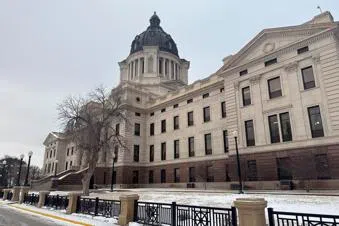
PIERRE, S.D. (AP) — In South Dakota, you will now need to live in the state for 30 consecutive days to be eligible to vote in the state’s elections, thanks to a bill the governor signed into law on Tuesday.
Republican Gov. Larry Rhoden signed bill HB 1066 along with several other bills aimed at promoting “free and fair elections.” The bill requires that an individual must have stayed in one permanent dwelling in the state, where one typically lives and sleeps, for 30 consecutive days to be eligible to vote. The requirement used to be just one night until a bill signed in 2023 changed the requirement to 30 nonconsecutive days.
“South Dakota continues to be an example of free and fair elections,” he said in a statement. “America is founded on the principle of freedom, and I am proud that we live in a nation and a state where we can choose our leaders.”
This bill aims to prevent full-time travelers, dubbed “RV voters,” from participating in state elections. Some travelers who do not have permanent residency in any state like to establish their residency in South Dakota because the state has no income tax and relatively lower car registration fees. Staying just one night in South Dakota is still enough to establish residency for purposes such as a driver’s license, but it is not enough to meet the voting eligibility requirements, said Brad Reiners, a spokesperson from the South Dakota Department of Public Safety.
Proponents of the bill argued that travelers who don’t actually live in the state shouldn’t be allowed to participate in state elections, while critics say longer residency requirements violate the idea that everyone gets to vote.
“This is a serious issue for new residents who have occupations that require them to travel frequently, residents who have family in another state needing care or regular visits, etc.,” said Samantha Chapman, advocacy manager at the ACLU of South Dakota.
However, the governor signed another bill, HB 1208, that allows those with mailing addresses in the state, but no physical abode, to receive a federal-only absentee ballot that would allow them to cast votes in the presidential and congressional elections.




Comments